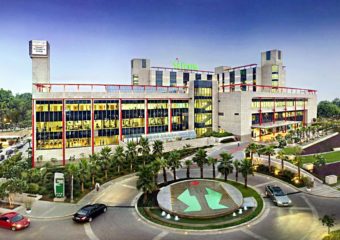Mitral Valve Replacement (MVR) Cost in India

The cost of Mitral Valve Replacement in India ranges between USD 6500 to USD 9000.
Stay in hospital is for 7 to 10 days and approximately 10-14 days outside the hospital.
Depending on stenosis (narrowing of valve), regurgitation (leakage of the valve), damaged or diseased valve, the success rate of Mitral Valve Replacement Surgery is 98%. Certain conditions like prolonged diabetes and low nephrotic function may have a comparatively lower success rate.
Tests required to diagnose damage in Mitral valve include Echocardiography, Transesophageal echocardiogram, Electrocardiogram (ECG), Chest X-ray, Cardiac MRI and Stress tests.
What is Mitral Valve Replacement?
Mitral valve repair and Mitral Valve Replacement (MVR) are procedures that are performed to treat diseases of the mitral valve — the valve located between the left heart chambers (left atrium and left ventricle). If the patient has mitral valve disease, they may eventually need mitral valve repair or mitral valve replacement surgery to treat the condition.
Several types of mitral valve disease exist. Treatment for mitral valve disease depends on the severity of the patient’s condition. Doctors may recommend surgery to repair or replace mitral valves for some people with mitral valve disease. Several surgical procedures exist to repair or replace mitral valves, including open-heart surgery or minimally invasive heart surgery.
Indications for Mitral Valve Replacement
Mitral Valve Stenosis- When a mitral valve does not open fully and restricts blood flow, may be due to an infection (infectious endocarditis).
Mitral Valve Regurgitation – When a mitral valve does not close properly and allows blood to leak back into the left atria.
severe mitral valve prolapse.
Recommended:- Mitral Valve Replacement Doctors In India
Signs and Symptoms
May be asymptomatic for many years. Signs and symptoms of mitral valve disease may include:
- Heart murmur on auscultation
- Easy fatigue
- Breathlessness
- Swelling in ankles and feet
- Irregular heartbeat
Tests and Diagnosis
Physical Examination- on auscultation physician will hear a heart murmur.
Echocardiography- An echocardiogram helps your doctor understand the mitral valve and how well it’s working.
Transesophageal Echocardiogram
Electrocardiogram (ECG). An ECG can detect enlarged chambers of heart, heart disease and abnormal heart rhythms.
- Chest X-ray
- Cardiac MRI
- Stress Tests
Before Procedure
- Standard blood tests are performed to check fitness for surgery.
- Patient counselled about the procedure and after care.
During Procedure
- Procedure performed under general anaesthesia.
- IV line inserted, breathing tube is inserted.
- Incision made in middle of chest, surgeon separates sternum to expose pericardium, then opens pericardium to expose heart.
- Connects heart to heart lung machine, tubes are used to reroute the blood into machine which takes over the function of heart and lung during the operation.
- Heart is temporarily stopped and blood removed, valve is still and allows surgeon to see it.
- Surgeon makes incision around edge of damaged valve and replaces it.
After Procedure
- After valve replacement, patient usually need to stay in hospital for about a week.
- You will be kept in intensive care unit (ICU) for initial days.
- The activity of your heart, lungs and bodily functions will be closely monitored, ventilator will be placed until you are able to breathe.
Draining tube – small tubes from your chest to drain away any build-up of blood or fluid.
Pacing wires – if necessary, these will be inserted near the chest drains to control your heart rate.
- Advised to follow a cardiac rehabilitation programme.
- Avoid strenuous exercise, sudden strains and heavy lifting for three months.
- You will be able to perform usual activities after 4 to 6 weeks.
- Report to the physician if any warning signs of infection.
- Consult your doctor regularly to check for efficiency of heart valve.
- If you have a mechanical heart valve, necessary to take anticoagulant medicine to help prevent clots.
Helpful: Structure of Mitral valve
Minimally Invasive Mitral Valve Surgery
In endoscopic surgery, your surgeon makes 1 to 4 small holes in your chest. Surgery is done through the cuts using a camera and special surgical tools.
Robotically-Assisted Valve Surgery
The surgeon makes 2 to 4 tiny cuts in your chest, the surgeon uses a special computer to control robotic arms during the surgery.
Complications of Valve Surgery
- Excessive bleeding
- Risk of infections
- Blood clotting
- Infection around the artificial valve
- Stroke
- Irregular heartbeat or arrhythmia
- Failure of the new valve
- Pulmonary oedema, pulmonary thromboembolism
- Renal failure
Factors Affecting Cost Of Mitral Valve Replacement
The cost to the patient depends on a variety of factors like
- The hospital, the patient chooses
- Type of Room
- Fee for the team of doctors and OT charges
- cost of medications
- Standard test and diagnostic
- cost of the valve
- Cost of the follow–up care required after the procedure.
Frequently Asked Questions About Mitral Valve Replacement
Q: What is Valve Replacement Surgery?
A: Replacing the old valve by the new valve is called replacement surgery. The surgeon may remove part or all of mitral valve and replace with a new one.
Q: What is Mitral regurgitation?
A: Mitral regurgitation is a condition wherein Mitral valve does not close properly causing blood to leak back into left atrium and thereby into lung.
Q: What is Mitral Stenosis?
A: Mitral stenosis is a condition wherein Mitral valve is narrowed and does not open enough restricting blood passing into left ventricle.
Q: How long it takes to recover from Valve Replacement Surgery?
A: The time it takes to recover varies depending on factors such as age and overall health, usually two to three months to recover.
Q: What are the advantages of Valve Repair over Valve Replacement?
A: Advantages to valve repair instead of replacement include:
- lower surgical mortality
- lower risk of stroke
- lower rate of endocardial infection
- After mitral valve repair, blood thinners are not required
Q: What changes do I need to make after Valve Replacement surgery?
A: You need to make lifestyle changes, it is important to eat healthy, do regular exercise, not smoke, take regular medication.
Q: When is surgery necessary in Mitral Valve disease?
A: Surgery might be necessary if the valve has deteriorated so much that repair is not possible or repair procedures have been already performed and can valve no longer be repaired.
Q: How long will I be hospitalised after surgery ?
A: After surgery, you will be in hospital for about 7-10 days.
Q: What are the advantages of mimimally invasive procedure?
A: Minimally invasive procedure has many benefits
- Less pain and blood loss
- Reduced infection chances
- Faster Recovery
Q: Will a repeat surgery be required to replace artificial valve?
A: Artificial valves last only for a limited time. Having valve surgery again depends on type of valve you have and other co morbid conditions.






